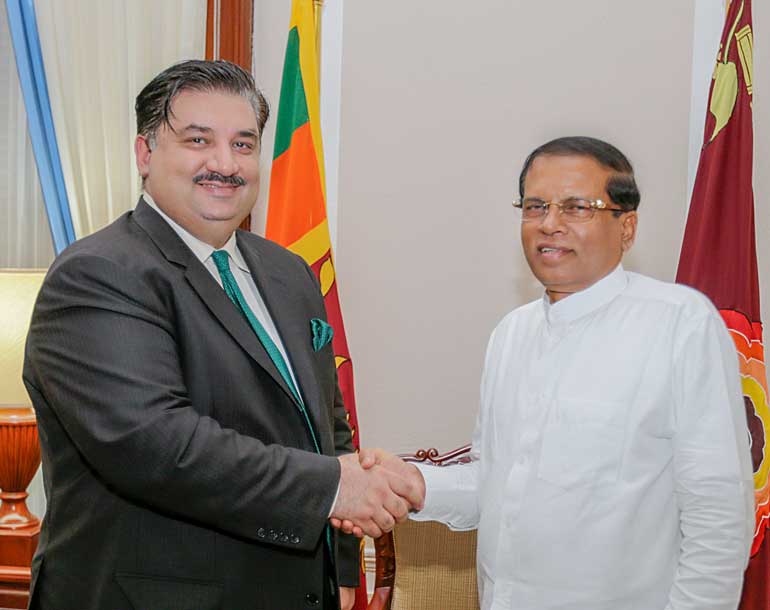Thursday Feb 19, 2026
Thursday Feb 19, 2026
Thursday, 12 November 2015 00:00 - - {{hitsCtrl.values.hits}}
 Commerce Minister of Pakistan Engr. Khurram Dastgir Khan called on President Maithripala Sirisena yesterday at the Presidential Secretariat – Pic by President’s Media
Commerce Minister of Pakistan Engr. Khurram Dastgir Khan called on President Maithripala Sirisena yesterday at the Presidential Secretariat – Pic by President’s Media
By Uditha Jayasinghe
Taking on the challenge of increasing bilateral trade, Pakistan Commerce Minister Khurram Dastgir Khan has outlined ambitious plans to widen the scope of the existing Free Trade Agreement (FTA) between the two countries by increasing joint ventures, tourism and trimming red tape ahead of Prime Minister Nawaz Sharif’s visit in January.
Khan is in Sri Lanka this week with a top business delegation to understand and iron out impediments to bilateral trade, primarily conducted through the FTA. Following extensive talks with Prime Minister Ranil Wickremesinghe, the Pakistani Commerce Minister said special focus would be given to appointing an official to iron out practical trade issues connected to the FTA and create awareness of its opportunities among Small and Medium Enterprises (SMEs). But the main focus will be to “widen and deepen” the scope of the existing FTA.
“We started discussing it when President Maithripala Sirisena was in Islamabad earlier this year stemming from the agreement that the FTA between Pakistan and Sri Lanka was for us the first we did with any nation. But now it’s 10 years old and has now reached what we call in economic terms the point of diminishing returns. The gains that could have been realised have been realised but it has now reached a stable state,” he said.
According to the Sri Lanka-Pakistan Business Council, imports from Pakistan to Sri Lanka fell year-on-year by $ 100 million to $ 279 million in 2014. Sri Lankan exports also stagnated at $ 74 million.
Officials from both sides have expressed dismay over current trade levels between the two South Asian allies. The decade-long Free Trade Agreement (FTA) between the two countries is responsible for 70% of trade.
The second phase of the FTA will focus on encouraging joint ventures in agro-food processing, pharmaceuticals, consumer goods, particularly attracting Pakistani investment in sugar and cement, he added. But it will not be expanded into a Comprehensive Economic Partnership Agreement (CEPA) as envisioned by India, making the negotiation process, in Khan’s view, easier. The Minister insisted both sides should have clear and consistent investment policies to improve trade.
Special attention will also be paid to increasing the efficiency of the existing FTA and ironing out bureaucratic hurdles.
“What we have formally proposed is to begin with each Commerce Ministry have one focal person who can deal with issues arising out of the FTA including confusions, delays, interpretations of statute; the appointed person will be responsible. Eventually we can have a framework but we will begin with focal persons, here again instead of negotiating for a long time to clear the structure we start designating a person now because there is a certain urgency to deepen our economic relationship.”
Acknowledging business visas are the significant bottleneck to improving trade, Khan stressed the need establish provisions to issue long-term and multiple entry visas. For full report, see Page 8